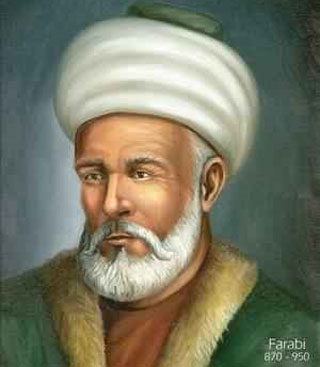
Depiction of al-Farabi
Abu Nasr al-Farabi (ca. 870-950 CE) was born in Central Asia. Two separate locations are mentioned in the contradictory (and frequently legendary) sources. His birthplace is said to be either in Farab on the Syr Darya river, or in Faryab (in modern Afghanistan). His ethnic origin has been in dispute. “Of Farabi’s life we know only that he came from Farab in Transoxiana and that his father was a captain of Persian, or probably Turkish, origin” (Fakhry 1983:107). Cf. Fakhry 2002:6, stating: “He is is said to have been a native of Farab in Transoxiana and of Turkish or Turkoman origin.” Cf. Mahdi 1971:523, deducing that his grandfather may have been a pagan convert to Islam; his father is said to have been an army officer of noble Persian descent, apparently in the service of the Samanid amirs. However, the family almost certainly spoke Sogdian or a Turkic dialect and exhibited Turkish manners and habits of dress (ibid). More recent commentary strongly indicates a Persian background (Rudolph 2016:536ff).
As a young man, Farabi migrated west to Baghdad, then a primary centre of learning which attracted numerous bibliophiles and scholars. Europe was at that time a primitive backwater by comparison.
In Baghdad, Farabi acquired a wide knowledge of Greek philosophical texts; he apparently did not know Greek. His teacher was the Syriac-speaking Nestorian Christian logician (and cleric) Yuhanna ibn Haylan (died between 908 and 932). At this period, “almost the entire Greek philosophical and scientific corpus that had survived in the Eastern Mediterranean and the Near East was translated upon demand into Arabic” (Dimitri Gutas, Alfarabi). Farabi became an editor of Arabic translations from Greek; his expertise in logic and the sciences strongly reflects Aristotelian themes. He also acknowledges Plato as a forerunner. He eventually became known in Islam as the “second teacher” (al-muallim al-thani) after Aristotle.
Most of the sources on the life of Farabi are unreliable, dating to the twelfth century and later, resorting to legends and stories to fill the factual gap. Many modern scholars tend to view Farabi as an Iranian, not a Turk as Ibn Khallikan (d.1282) suggests. The works of Farabi on logic reflect Alexandrian Aristotelianism, a Greek tradition revived in Baghdad, where he probably studied. He was definitely in Baghdad until 942, after which he moved to Syria, where he apparently died at Damascus (Dimitri Gutas, “Farabi i. Biography,” Encyclopaedia Iranica online).
Farabi’s knowledge of the works of Aristotle was extensive. “His teachings had a strong Aristotelian background and at the same time a significant Neoplatonic bent. One of the greatest Islamic thinkers, Avicenna [Ibn Rushd], explicitly admits in his autobiography his intellectual debt to al-Farabi through whom he was able to understand the Metaphysics of Aristotle” (Luis Xavier Lopez-Farjeat, “al-Farabi’s Psychology,” Stanford Encyclopedia of Philosophy).
The output of Farabi is attended by specialist arguments, e.g., whether he wrote the Harmonisation of Opinions (of Aristotle and Plato), a work reflecting a theme arising centuries earlier in the Alexandrian tradition. The Harmonisation argues for a strong affinity, while conceding “certain differences of temper or demeanour between the Two Sages, such as Plato’s otherworldliness and contempt for earthly possessions, as contrasted with Aristotle’s worldliness, as illustrated by his marriage, his service to Alexander, the king, and his amassing of fortune” (Fakhry 2002:32).
Textual quandaries hinder definitive conclusions. “Much more work still needs to be done, but a clearer and more complex picture of al-Farabi’s works is emerging” (Therese-Anne Druart, “al-Farabi,” Stanford Encyclopedia of Philosophy).
The Alexandrian school of Neoplatonism flourished in the fifth and sixth centuries CE. This tradition subsequently moved from Egypt to Syria.
The Alexandrian Neoplatonists saw philosophy as an avenue by which we can achieve happiness through knowledge of the One. To add intellectual rigour to this mystical endeavour they included the logical writings of Aristotle in the early stages of their teaching syllabus. They devised a body of introductory texts to explain how Aristotle’s logic saves us from incorrect thinking and acting, and why Aristotle devised his logic syllabus – his Organon – in the form that he gave it. Some features of al-Farabi’s presentation are most easily explained in terms of the Alexandrians. (Wilfrid Hodges and Therese-Anne Druart, “al-Farabi’s Philosophy of Logic and Language,” Stanford Encyclopedia of Philosophy)
The Metaphysics of Aristotle has ambiguities that impede understanding. The lack of resolution contributed to the different standpoints adopted by Ibn Sina and Ibn Rushd. Farabi was evidently aware of the textual drawback. He contributed his own version, apparently believing that Aristotle omitted relevant components found in the Neoplatonist tradition. “Farabi does not merely offer refinements on Aristotle’s general metaphysics but also develops a full blown special metaphysics, thereby completing Aristotle’s project” (Therese-Anne Druart, “Farabi iii. Metaphysics,” Encyclopaedia Iranica online).
Farabi furthered his metaphysical format in the “emanationist” texts, which are Mabade ara ahl al-madina al-fazela (Opinions of the People of the Virtuous City) and al-Siyasa al-madaniya (The Political Regime). In these books, Farabi combines Neoplatonist emanationism and the Aristotelian version of celestial spheres in a “political philosophy.”
In addition to being a philosopher and logician, Farabi was also a practising musician. Four of his eight musical texts have survived. His lengthy work Kitab al-Musiqa (Book on Music) is the most important musical treatise surviving from medieval Islam. This document was unknown in medieval Europe; the Christians there were familiar only with a short chapter on music in another book of Farabi. “Scholars of medieval European music are seldom aware of Farabi’s importance for music theory or the significance of his commentaries on the works of the ancient Greek music theorists” (George Sawa, “Farabi v. Music,” Encyclopaedia Iranica online).
Farabi is reported to have adopted the ascetic robe of Sufis. The source is Ibn al-Qifti (1172-1258), an Egyptian Arab annalist. This detail has provoked some disagreements; the reason for wearing such robes discernibly varied. If true, the preference of Farabi might be explained by a celibate lifestyle (he is reported to have died a bachelor). However, it is clear enough that Farabi was not a typical renunciate; his conceptual approach differed radically from pietist attitudes generally expressed by Sufis. Farabi basically exhibited an independence, his role denoting that “philosophy represented free thinking, or, better, the freedom to think” (Netton 1992:7).
In this capacity, some commentators say that he attempted a philosophical reconciliation of Aristotle with Islam, something of considerable relevance at that era. Nevertheless, there are strong indications that Farabi considered philosophy to be superior to religion. The crux of the matter is that he contributed his own “neo-Aristotelian” philosophical system.
His corpus extends to over a hundred attributed works; only a proportion of these have survived. Many of his extant works are devoted to logic and the philosophy of language. The confrontation between Greek and Arabic raised problems for philosophical solution in language. Many centuries before J. L. Austin and Wittgenstein, Farabi made his own analysis of language, though in very different circumstances.
His logical works include both independent treatises and commentaries on Aristotle. Farabi was also much concerned with political philosophy, for which he is best known. His writings on metaphysics are a complex area, with some earlier interpretations being outdated, and attended by the issue of misattributed works.
Despite his Aristotelian abilities, Farabi adopted the Neoplatonist theme of emanation. Unlike others of his period, he is thought to have recognised that the Neoplatonist teaching, found in the influential Theology of Aristotle (a version of the Enneads of Plotinus), was not in fact Aristotelian. His standpoint has been considered ambiguous in this respect.
While his logical works are basically Aristotelian, his political philosophy is described as Platonist in orientation. Farabi’s major work in this area is Mabade ara ahl al-madina al-fazela (Opinions of the People of the Virtuous City). He was here concerned with the ideal political state and aberrations from the ideal; to some extent, his treatment is reminiscent of discussions in Plato’s Republic. Farabi’s version of the afterlife differed from the orthodox religious conception, instead relating to the stage of “acquired intellect” achievable by citizens of the “virtuous city” (see further Galston 1990).
“Alfarabi is notorious for the caution with which he writes” (Parens 2006:5). That caution has been viewed in terms of a defensive measure against dogmatic attitudes opposing rationalism (see also Islamic Philosophy).
Farabi’s achievement is that he was the first philosopher who succeeded to internationalise Greek philosophy by creating in a language other than Greek a complex and sophisticated system far surpassing the elementary efforts of both the early medieval Latins and his Syriac predecessors. (D. Gutas, “Farabi iv. Farabi and Greek Philosophy,” Encyclopaedia Iranica online)
Farabi also notably composed the influential Ihsa al-Ulum (Enumeration of the Sciences). In this Arabic work, “Farabi outlined the bases for study in scientific disciplines as then known: the science of language, logic, mathematics, optics, astronomy (and astrology), statics (the science of weights), mechanics, physics, metaphysics, jurisprudence, rhetoric, and music” (Shepherd 1991:171-2).
The Ihsa was translated into Latin during the twelfth century, under the new title of De Scientis. This proved a key text in the early transmission of Aristotelian thought to Christendom, even though Farabi (alias Alpharabius) was translated to a lesser extent than his successors Ibn Sina and Ibn Rushd.
The designation “School of Al-Farabi” has been applied to certain other diverse tenth century thinkers. Yahya ibn Adi (d.974) was a Christian logician and a pupil of Farabi. There was also Abu Sulayman al-Sijistani (d. 987/8), a distinctive pupil of Yahya who became influential in Baghdad. A more diverging figure was Abu Hayyan al-Tauhidi (d.c.1023), a commentator described as an eclectic “philosophico-mystic” with a disposition to both Neoplatonist and Sufi thinking. An independent entity was Abu’l Hasan al-Amiri (d.992), a philosopher with some Sufi tendencies (see further Netton 1992:8ff).
Bibliography
Butterworth, Charles, trans., Alfarabi: The Political Writings (two vols, Cornell University Press, 2001-2015).
Fakhry, Majid, A History of Islamic Philosophy (second edn, Columbia University Press, 1983).
——–Al-Farabi, Founder of Islamic Neoplatonism: His Life, Works and Influence (Oxford: Oneworld, 2002).
Galston, Miriam, Politics and Excellence: The Political Philosophy of Alfarabi (Princeton University Press, 1990).
Mahdi, Muhsin, trans., Philosophy of Plato and Aristotle (1962; revised edn, Cornell University Press, 2001).
——–“Al-Farabi” (523-525) in Dictionary of Scientific Biography Vol. 4 (Princeton University Press, 1971).
Netton, Ian R., Al-Farabi and his School (London: Routledge, 1992).
Parens, Joshua, An Islamic Philosophy of Virtuous Religions: Introducing Alfarabi (State University of New York Press, 2006).
Rescher, Nicholas, Al-Farabi: An Annotated Bibliography (University of Pittsburgh Press, 1962).
Rudolph, Ulrich, “Abu Nasr al-Farabi,” in Rudolph et al, eds., Philosophy in the Islamic World Vol. 1: 8th – 10th Centuries (Leiden: Brill, 2016).
Shepherd, Kevin R. D., Meaning in Anthropos: Anthropography as an Interdisciplinary Science of Culture (Cambridge: Anthropographia, 1991).
Walzer, Richard, ed. and trans., Al-Farabi on the Perfect State (Oxford University Press, 1985).
Kevin R. D. Shepherd (2010, article modified 2021)
ENTRY no. 17
Copyright © 2021 Kevin R. D. Shepherd. All Rights Reserved.

